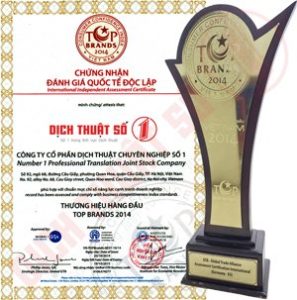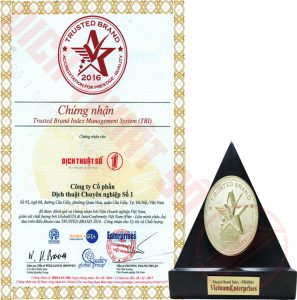Vocabulary is an important foundation in any language and Thai is no exception. To communicate fluently, mastering Thai vocabulary is the first step and also one of the key factors that helps learners easily express their ideas.
No.1 Translation will provide details on basic and common Thai vocabulary and effective learning methods in the article below.
>>>See more: How to Learn Thai Alphabet Easily – Great Tips for You
Why is it important to master basic Thai vocabulary?
Thai is the official language of the Kingdom of Thailand, widely used in everyday communication, education and culture. Mastering alphabet and basic vocabulary is an important first step to understanding and using this language effectively.
- Daily communication naturally: Mastering Thai vocabulary is the key to effective communication in everyday life. Knowing and using the right vocabulary will help you handle common situations such as shopping, asking for directions, ordering food, and even chatting with locals.
- Gain a deeper understanding of Thai culture and lifestyle: Language and culture are closely linked. Learning Thai vocabulary is not just about acquiring language, but also about exploring culture, thinking and the way Thai people express their emotions.
- Comprehensive development of language skills: Vocabulary is the foundation of all language skills, including listening, speaking, reading and writing. As your vocabulary expands, you will find it easier to understand conversations, improve your reading comprehension and express your thoughts more clearly and precisely in words and sentences.
- Support for learning grammar and sentence structure: Mastering vocabulary will help you easily access and gain a deeper understanding of Thai grammar structures. When you understand how to use words in the right context, you will find it easier to construct more accurate and natural sentences.
- Create a solid foundation for work and travel: If you intend to work in Thailand or take part in long-term tours, mastering Thai vocabulary will bring many great benefits. In the working environment, professional and fluent communication will build trust and build good relationships with colleagues and partners. When traveling, understanding the local language will help you easily interact and explore the culture and life of the locals.
- Boost your confidence and open up new language learning opportunities: Mastering Thai vocabulary not only helps you become more confident in communication, but also opens up opportunities to learn other languages in the Southeast Asian region such as Lao or Khmer, due to many similarities in grammar and vocabulary.
Overall, deciding to learn common Thai vocabulary is not only a smart investment in yourself, but also brings many important benefits in your personal life and career.

>>>See more: Thai alphabet and standard reading for beginners
The most effective method to learn common Thai vocabulary
Do you find learning Thai vocabulary difficult and tiring? Traditional learning methods make you lose interest? Don't worry, below is a summary of the most effective methods for learning Thai vocabulary:
Method 1: Learn Thai vocabulary through standard pronunciation
Understanding the relationship between vocabulary and pronunciation is a key factor in learning Thai. Correct pronunciation not only helps you memorize vocabulary easily, but also helps you grasp the rules of pronunciation of vowels in similar groups of words. When you learn how to pronounce each word correctly, you not only memorize vocabulary faster but also improve your pronunciation, getting closer to speaking Thai like a native.
>>>See more: Thai to Vietnamese Translation – Fast and Accurate
Method 2: Learn Thai vocabulary through recordings of native speakers
One of the main reasons why Thai learners have difficulty is due to incorrect pronunciation. To overcome this, you should learn vocabulary by listening and repeating along with recordings of native speakers. Keep the volume high, listen carefully and repeat the vocabulary many times. In addition, learn about vowel, consonant and marks in Thai before you start learning vocabulary. This will not only help you learn vocabulary but also improve your ability to pronounce correctly.

Method 3: Apply the “Three Best Method”
Learning vocabulary without the right method will lead to low efficiency even if you spend a lot of time. To improve, apply the “three best method”: Learn words with the loudest, clearest and fastest sound. When implementing this method, your concentration will be pushed to the highest level, thereby helping to increase the ability to memorize and master vocabulary quickly.
>>>See more: Accurate and Cost-Effective Thai Translation Services
Method 4: Classify Thai vocabulary by topic
Thai has many words that belong to the same group, so it is easy to categorize and learn them. Thai vocabulary by topic or have similar characteristics will help you remember vocabulary more easily. Use a notebook to classify words, write them down on sticky notes, then focus on reviewing each group. This method will help you remember vocabulary systematically and more effectively during the learning process.
Method 5: Learn basic Thai vocabulary through word forms
This is one of the effective methods that many people apply when conquering Thai. In Thai, vocabulary exists in many different forms such as nouns, verbs, adjectives and adverbs, with many variations that change the meaning of the word. To master vocabulary, you first need to understand the characteristics of each type of word and how they change in sentences. By learning words in groups of forms, you will not only easily remember the words but also have a deeper understanding of how to use them, thereby significantly improving your language ability.
>>>See more: Thai Translation By Native Translator – Related
Method 6: Allocate time to learn Thai vocabulary reasonably
Learning vocabulary does not have to be a continuous process throughout the day. You can take advantage of free time such as in the morning after waking up, before going to bed, while waiting for the bus or even when doing housework to learn vocabulary. Always carry Thai learning materials with you and practice whenever possible. By allocating time reasonably and taking advantage of small moments during the day, memorizing vocabulary will become easier and more effective.

Method 7: Learn vocabulary through synonyms and antonyms
When learning a new word, you can associate it with synonyms or antonyms to make it easier to remember. Try combining vocabulary learning by grouping positive and negative words into pairs, learning the main word and related words at the same time. This method not only helps you expand your vocabulary quickly but also creates connections between vocabulary, helping you remember more deeply and increase your ability to use language flexibly in communication.
Method 8: Combine vocabulary learning and translation
Every time you come across a Thai word, you should quickly think of the corresponding Vietnamese meaning and do the opposite when you come across a Vietnamese word. To improve efficiency, you can practice with friends: They say the Thai word and you immediately translate it into Vietnamese or vice versa. The bilingual translation learning method not only helps you consolidate your vocabulary but also improves your reflexes and translation, thereby improving language skills comprehensively.
>>>See more: TOP 7 best Thai translation companies today
Most Common Thai Phrases
Below is a list of the most common Thai vocabulary phrases with phonetic transcriptions:
| STT | Thai vocabulary | Pronunciation | Meaning translated into Vietnamese |
| 1 | Sawasdee | /sa-wat-dee/ | Xin chào |
| 2 | ขอบคุณ (khob khun) | /khawp-khun/ | Cảm ơn |
| 3 | bottle | /bottle/ | Have |
| 4 | tomorrow | /tomorrow/ | Không |
| 5 | sabaidee | /sa-bai-dee/ | How are you? |
| 6 | เท่าไหร่ (thao rai) | /thao-rai/ | How much? |
| 7 | ahan | /a-han/ | Thức ăn |
| 8 | Male (male) | /male/ | Nước |
| 9 | ห้องน้ำ (hong nam) | /Southern-Southern/ | Bathroom |
| 10 | รถแท็กซี่ (rot taxi) | /rot-tak-see/ | Taxi |
| 11 | โรงแรม (rong raem) | /rong-raem/ | Hotel |
| 12 | talat | /ta-lat/ | Market |
| 13 | thot | /khor-thot/ | Xin lỗi |
| 14 | Thai | /puay/ | Sick |
| 15 | hiu | /hiu/ | Hungry |
The table above provides basic and common Thai vocabulary phrases, along with pronunciation and Vietnamese translation to aid in everyday communication.

>>>See more: The Best Way to Translate Vietnamese Names into Thai
Why choose PDF format? – Download link for Thai vocabulary PDF file
Using Thai vocabulary list pdf brings many practical and convenient benefits to learners:
- Convenient and easy to use: The PDF format allows you to access the vocabulary list anytime and anywhere, as long as you have a device that supports PDF reading such as a mobile phone, tablet or computer.
- Notes and Highlights: PDF allows you to easily take notes and highlight important vocabulary or items to focus on, helping you organize and track your learning process effectively.
- Convenient printing: You can print out vocabulary lists to study when you don't have an internet connection, which is useful in situations like traveling or when it's inconvenient to use an electronic device.
- Easy search: PDF supports the function of searching for words or phrases throughout the document, helping you save time and effort in looking up information.
- Small capacity: PDF format reduces file size compared to other text formats, saving storage space on your device.
SUMMARY OF BASIC AND COMMON THAI VOCABULARY FILES – DOWNLOAD NOW
>>>See more: Where to Go and What to Eat in Thailand?
So we have explored together the most common Thai words. Mastering vocabulary will help you confidently communicate in everyday situations in Thailand. Hopefully this article has provided you with effective methods for learning Thai vocabulary, suitable for your own needs and learning style.








